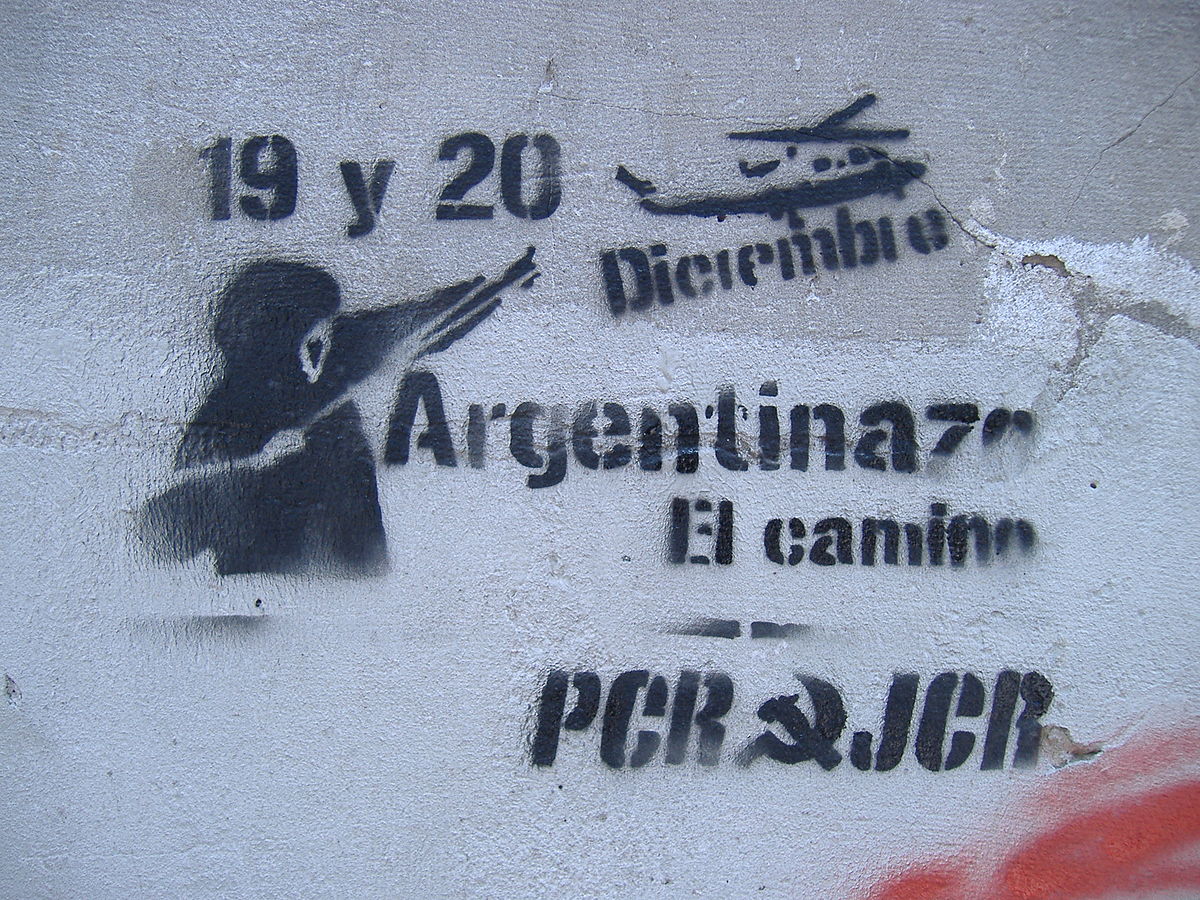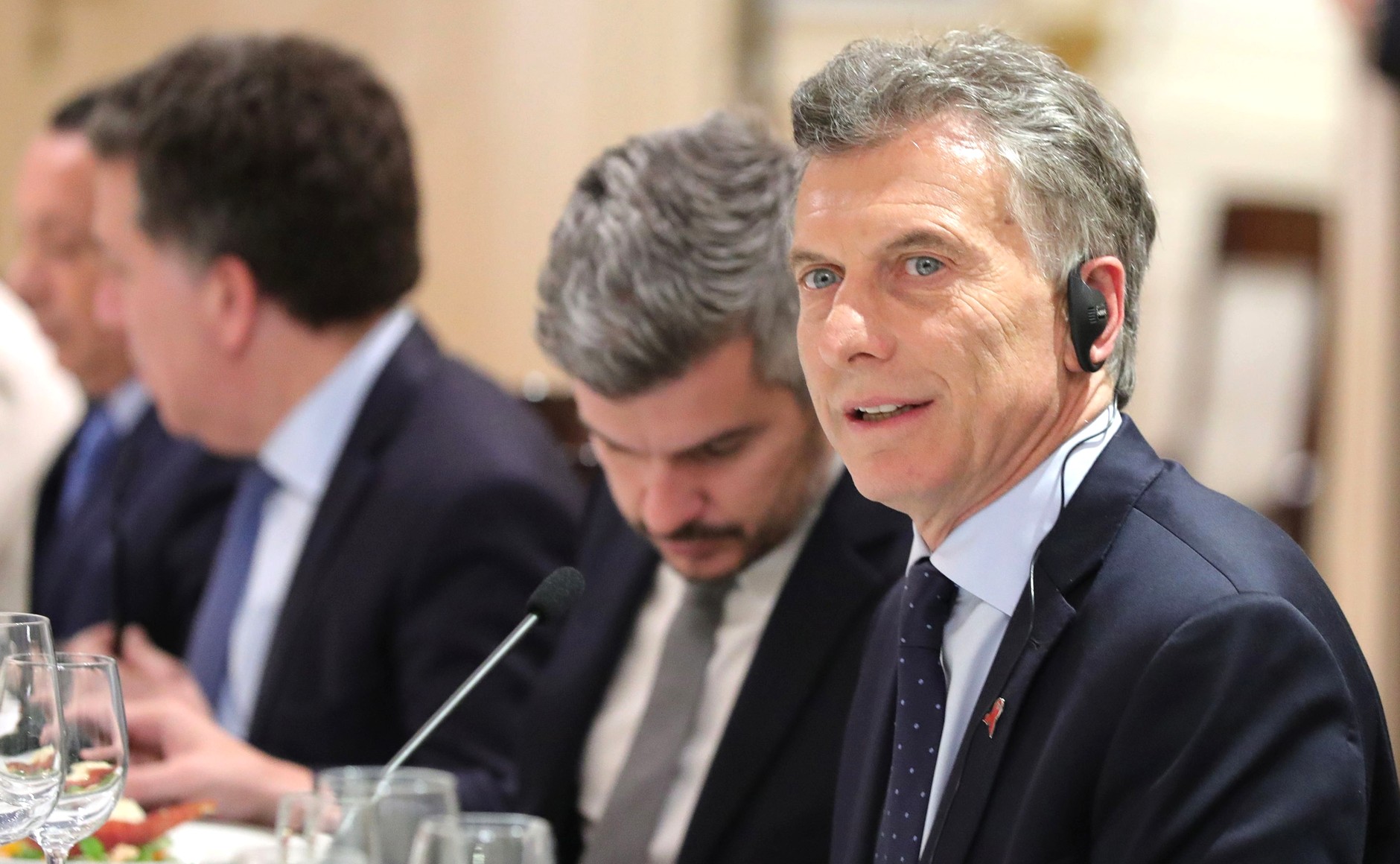In the last week of March, the global capitalist crisis was expressed in the fall in value, over two consecutive days, of the most important stock exchanges in the world. Added to this is the collapse in the currencies of the so-called emerging economies and the deepening trade war between China and the United States. Although still in its early stages it is set to be a shock to the global economic system. In short, we are in the throes of a recession and are yet to witness its full extent.
This editorial statement was originally published on 3 April at El Militante |
In Argentina, the dollar’s unbridled rise in value has had a negative effect. The peso was devalued by three percent in a single day to 45 pesos to the dollar, exposing President Mauricio Macri once again to the scrutiny of those sections of his support base who were loyal to him only a few months earlier.
As a result, Macri launched a monetary scheme with an “attractive” peso rate so the major players in the financial world wouldn’t shift over to the dollar. All the same, they still can’t reduce it to $43 to the peso.
Moreover, the government authorised the banks to make use of all available assets in the form of deposits, something that workers and those with small savings know all too well, as it portends to the possibility of new restrictive economic measures similar to those implemented in 2001. This measure not only removes pesos from the market in an attempt to “halt” inflation, but also tries to safeguard the investments of speculators.
The economic and political situation in the country has deteriorated over the past few weeks. The poverty level rose by two percent and now affects 32 percent of the population. Many industries continue to close upon reaching 51 percent of operational capacity. Debts continue to rise even with the guidelines that the IMF has set.
It would seem the only thing President Macri has had to say is “you’ve got to bear with it, I know what I’m doing”. The people are being told to wait for things to get better. But what hasn’t been mentioned is the swindling and looting of the masses and the bleak future that awaits the next generation.
This unease has even reached the ranks of Cambiemos (the ruling right-wing coalition party). The clearest expression of this is the split from the party of the UCR (Radical Civic Union) which only just joined Cambiemos three years prior.
For example in Córdoba, the UCR candidates left Cambiemos and candidates in Tucumán and Mendoza soon followed. Another such political tremor is the defeat of Cambiemos in Neuquén, where they only ranked third place with 15 percent of the vote.
The Supreme Court of Justice is also distancing itself from the government by not backing the reelection of the Cambiemos and Alternativa Federal candidates in the provinces of La Rioja and Río Negro, which will bolster the Kirchnerist candidates.
And so it continues: old allies, the Radicals among them, fleeing from Cambiemos like rats from a sinking ship in an attempt to distance themselves from the results of the economic and social policies and the government’s political deterioration.
An uncertain future
The desperation of hundreds of thousands of workers, unemployed working-class families, thousands of young people born and raised in poverty and the dismantling of industry’s operational capacity speaks to the economic, political, social and cultural decay, which has hit its lowest levels since 2001.
 The bourgeoisie and imperialism, represented by the IMF, have learned their lesson after the events of 2001, and will continue to defend this exploitative Macri regime / Image: Pablo D. Flores
The bourgeoisie and imperialism, represented by the IMF, have learned their lesson after the events of 2001, and will continue to defend this exploitative Macri regime / Image: Pablo D. Flores
In 2001, multinationals that remained with state-owned businesses carried most of the external debt and stopped the ball rolling by not transferring more money to the National and Regional financial reserves; with a section of the bourgeoisie deciding to shuffle their cards and deal a new hand. The mass movement entered through this fissure and managed to bring about a political and social situation never seen before in the country in what is known as the Argentinazo.
Not only the bourgeoisie as a whole but also imperialism, represented by the IMF, have learned their lesson. Thus, the bourgeoisie, despite their factions and disputes, defend this regime of exploitation and impoverishment. It is on the altar of precious parliamentary democracy that the consecrated achievements of the bourgeois constitution are offered up, the very same achievements that cost the blood, sweat and tears of the Argentine working class, and which hold them in such high esteem.
The financial arm of imperialism also holds up the Macri administration and gives him the ability to govern with the help of a $9.6bn deal. But nothing is as simple in the capitalist world as greed and financial speculation. You need only consider the behaviour of the financial and industrial sectors. They offload the debt of the crisis onto the working class and neglected sections of society, from whom significant amounts of money are extracted, which ends up in the pockets of the capitalists.
It’s not just Macri, it’s capitalism
As we already mentioned, the capitalist crisis, which stretches to all corners of the world, is a crisis of overproduction. We find ourselves before a new phase of currency crises and market hysteria. We are at the cusp of another possible recession. During the last 10 years, all attempts by the bourgeoisie to restore economic equilibrium after the crisis of 2008 have risked destroying the political and social equilibrium. This has been confirmed by global events. In countless countries, governments’ attempts to impose austerity measures have set off social explosions of an unprecedented nature. It’s what we have witnessed in France with the Yellow Vests; in Britain with Brexit and in the recent past, the crisis faced by the southern European countries. In addition, we have seen the rising deficit in the US, which led to Trump implementing protectionist measures and his new order; the political and economic crisis in Brazil; economic warfare in Venezuela besieged by imperialism; and the mass movements against the Jovenel Moïse regime in Haiti.
In our 2018 Global Perspectives document, we pointed out that:
“Marxism states that the secret to the viability of any economic system is to achieve maximum economy during working hours. Rising labour productivity was precisely one of the most important elements of capitalist development. For 200 years, capitalism raised the productivity of the workforce up to a level never before contemplated. But it has now reached its limit.
“A study carried out in September 2015 on productivity by the Centre for Economic and Policy Research revealed that, between 2007 and 2012, global productivity rose to an annual rate of 0.5 percent; half of which came from 1996-2006. However, in the more recent period of 2012-14, productivity stayed at 0 percent. In countries like Brazil and Mexico, it was negative. As the report shows: ‘this is one of the most troubling and undoubtedly the most important phenomena affecting the global economy.’
“These figures are a clear indication of the crisis of capitalism. The slow growth of (and in some cases, the drop in) labour productivity is a peculiar symptom of the dead-end that is capitalism, which is no longer capable of achieving what it used to in the past.”
The October elections
Both sides of the political divide are in full swing as the October elections draw nearer. It seems as though hunger and unemployment are the main issues the candidates promise to solve in an uncertain future.
The electoral process will last 48 weeks between the municipal elections and elections for regional MPs, plus the presidential elections in October. The façade of the corrupt electoral system encourages the masses to continue to have faith in institutions that have already started to deteriorate before their eyes.
There’s a situation that the bourgeoisie don’t know how to solve: the largest minority, led by the ex-President Cristina Kirchner, holds 33 percent of the electorate. On the other hand, there are candidates like Roberto Lavagna and Felipe Solá (both of the Justicialist Party, which is Peronist) who cannot consider an anti-Macri front without Kirchnerism. But also the Federal Peronists (anti-Kirchnerists) may form an alliance with the Kirchnerists on the proviso that Cristina Kirchner is not the leader.
Lavagna has received statements of support from various regional governors as well as the trade union leadership according to Luis Barrionuevo (head of the hospitality trade union UTHGRA): “trade unionists have expressed their support for Roberto Lavagna if he decides to be a candidate.” Urtubey, the governor of Salta said “according to my information, there’s no political party which has over 30 percent support in the polls. So, neither Macri nor Cristina have 40 percent of voter support.”
The ruling party has lost part of its electorate, which now stands at 25 percent. The Governor of Buenos Aires, María Eugenia Vidal is distancing herself from President Macri, just like most of the candidates who are moving away from the president’s poor public image.
 None of the candidates have put forward a serious plan for the country to climb out of deep recession. Only the working class can liberate the workers of Argentina / Image: Flickr, Secretaría de Cultura de la Nación
None of the candidates have put forward a serious plan for the country to climb out of deep recession. Only the working class can liberate the workers of Argentina / Image: Flickr, Secretaría de Cultura de la Nación
What’s striking is that no one is talking about how to get out of the economic crisis; all the candidates talk about is politics, about the likely victory of the anti-Macri front which will instigate an unknown policy plan. Axel Kicillof, a potential Kirchnerist candidate for the province of Buenos Aires, has already clearly stated that the economic situation is totally different compared to 2015 and we should more or less accept these newly imposed rules.
We can assert that none of the candidates have put forward a serious political or economic plan for the country to climb out of the deep recession.
Only the working class can get the millions of workers in Argentina and around the world out of the crisis.
Our class experience teaches us that the workers can only rely on our own strength and mobilisation.
There is nothing in the world that can happen without workers giving the go-ahead. Taking our destiny into our own hands seems all the more possible to thousands of people.
Capitalism only provides us with misery and depredation. Capitalists pollute the seas and rivers; exhaust the land and leave subsoil waste behind without treating the surface, thus contaminating freshwater deposits; they pollute the air and pump fields and plants with insecticides that make us extremely ill.
In the last decade, we have witnessed the accelerated and chaotic structural decline of capitalism. All for the sake of profit and the private ownership of the means of production.
Recession results in unemployment, repression and suffering for the workers. We know that we must fight for our own form of democracy, for the space to air our grievances in parliament. But we also know that, although parliament can be a sounding board for the best of workers, it’s essentially a space reserved for the bourgeois politicians who are the representatives of the ruling class and only seek profit.
We need our own organisation, an organisation that represents us, a workers’ party that unites millions of workers, labourers, young people and the unemployed.
Why build a workers’ party specifically? Because wage-earning workers form the vast majority of Argentinian society; they are the backbone that holds up the country’s economic and social structure. We cannot continue to support alternative parties that do not represent working-class interests.
Since the beginning of the 20th century, our country’s working class has seen various political trends: anarchism, the socialism of Justo and Palacios, revolutionary syndicalism, the Communist Party and Peronism from 1945 onwards. It’s a fact that after more than 100 years of an organised labour movement in Argentina, the working class has not been able to create their own mass party.
However, we’re not talking simply of the formal creation of a workers’ party, but rather a party with a solid basis in the working-class masses. This major task must be promoted among the militant workers’ unions, particularly in first-and-second-tier organisations such as internal committees and delegated bodies.
The country is faced with an unprecedented situation, to the extent that we are suffering from a global recession, deeper than the crisis of 1929. Whoever wins the elections in October, 2020 won’t be any better; they will surely say that, due to the global situation, there’s very little they can do.
We have to prepare for even more instability. Preparing for what’s to come means getting to work on creating our Labour Party.
Socialism or capitalist barbarism.

